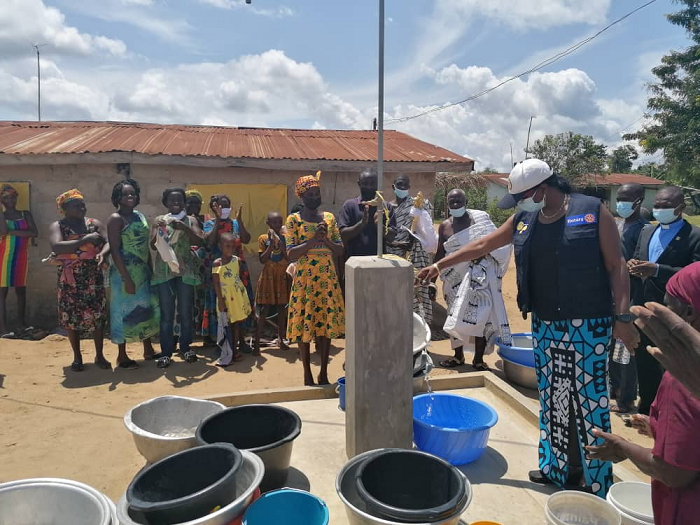
Rotary International, USAID provide Dokrochiwa community with water
The Rotary International (RI) and USAID in collaboration with the Rotary Club of Accra-Labone have constructed and handed over a groundwater based piped water supply system for the people of Dokrochiwa at the Ayensauno District of the Eastern Region.
The groundwater based piped water supply system, with a 50,000 –liter capacity elevated concrete water storage tank, is expected to serve about 3,500 residents in the community.
![]()
The water system also came with a 2,300-metre length water transmission and distribution pipelines, with five standpipes at strategic locations within the town.
Biggest project
The District Governor (DG) of the Rotary District 9102, Madam Yvonne Kumoji, speaking at a short ceremony to inaugurate the project on Friday, May 21, 2021, said the project, which fell under the Rotary International-USAID Water and Sanitation Project, cost GH¢573, 569.50.
She said the Dokrochiwa water system was so far the biggest water project to have been undertaken under Rotary International-USAID Water and Sanitation Project in the country.
![]()
She said RI as a service organisation whose stated purpose is to bring together business and professional leaders in order to provide humanitarian service and to advance goodwill and peace around the world, was very much interested in the welfare of underprivileged communities such as Dokrochiwa.
Sustainability
DG Kumoji said water provision was part of the seven focus areas of RI, urging the people of Dokrochiwa and engineers at the Ayensuano District to regularly maintain the water system to ensure its sustainability.
She, however, commended the people of Dokrochiwa for cooperating with Rotary for the construction of the water system.
The Chairman of Host Committee of RI-USAID Water and Sanitation Project, Mr Ako Odotei, expressed the hope that the water system would go a long way to help the people in the community against water borne diseases.
He noted that water and sanitation was a paramount area for both Rotary and USAID, pointing out that the partnership between the two organisations started as far back as 2009.
For him, the partnership between the two organisations had seen many communities in the country benefitting from water and sanitation projects, including construction of toilet facilities for schools.
Hygiene
Mr Odotei also urged the chiefs in the community to prioritise water and sanitation activities such as ensuring that every home in the community got a toilet facility.
![]()
He further admonished the committee set up to manage the water system to work hard to ensure that the water system did not break down, stressing that sustainability was of great importance to Rotary.
Background
The Vice President of the Rotary Club of Accra-Labone, Mr Carlis Arko, said the construction of the Dokrochiwa water supply system started in 2016, following needs assessment.
He added that in 2018, the sitting and drilling of the borehole was completed, pointing out that in October 2020, the construction of the piped water system was started and within a period of five months, the project had been completed.
He therefore expressed his gratitude to the Rotary Foundation for their continued support, saying “Rotary Foundation is the heart beat of Rotary International where all projects beneficial to the community and the underprivileged are funded.”
Mr Arko also commended the contractor, Jonakot Construction Limited as well as the Consultant, Superhydro Limited, the supervising team and all club members of the Rotary Club of Accra-Labone for their various roles in the timely execution of the project.
![]()
He said the Dokrochiwa water system also formed part of activities of the Rotary Club of Accra-Labone to celebrate their 20th anniversary.
Appreciation
The Chief of Dokrochiwa, Berima Nana Kwabena Mensah Opoku Agyeman, commended the Rotary International, USAID and the Rotary Club of Accra-Labone, for the gesture.
For him, the water system would not only contribute to improved health in the community, but would also lessen the stress people in the community had to endure to access to water.
